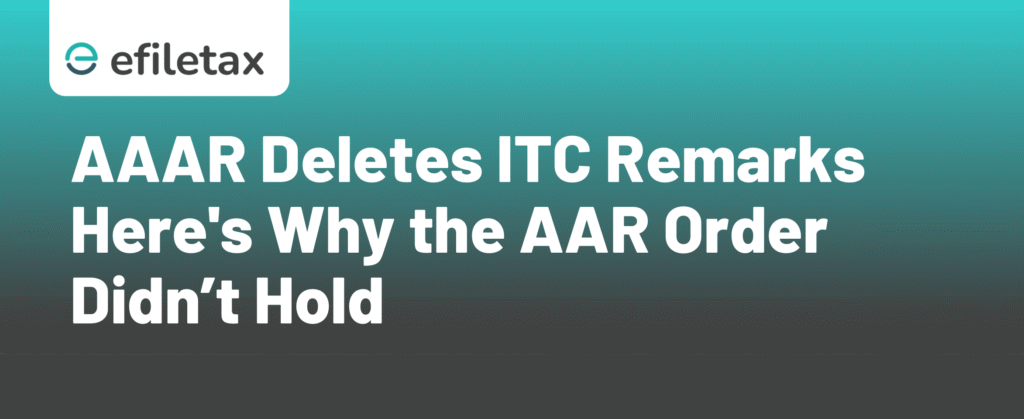
ITC Observations Expunged by AAAR – Explained Simply
When the Appellate Authority for Advance Ruling (AAAR) expunges remarks related to Input Tax Credit (ITC), it’s not a loophole — it’s grounded in law. This article breaks down a recent AAAR ruling where ITC observations were deleted because the original Authority for Advance Ruling (AAR) never dealt with ITC in the first place.
Let’s simplify what this means for Indian taxpayers and consultants.
What Happened: AAAR Deletes ITC Remarks
In a recent case, the AAR issued a ruling without touching upon the topic of ITC. However, the taxpayer noticed that the AAR still made certain negative remarks about ITC eligibility in the obiter dicta (casual observations, not part of the main ruling).
When the taxpayer appealed, the AAAR held:
“Since the issue of ITC was not raised in the original application and not decided by AAR, any remark on ITC has no legal standing and is therefore expunged.”
Legal Basis: Why AAAR Expunged ITC Remarks
The decision rests on two key legal principles:
- Scope of Advance Ruling (Section 97 of CGST Act):
AAR can rule only on questions listed under Section 97(2), such as classification, rate of tax, registration, etc.- If ITC was not one of the questions raised, it is outside AAR’s jurisdiction to comment on it.
- Judicial Discipline:
AAR should restrict itself to the issues submitted. Any unsolicited commentary is not binding and can be struck down in appeal.
What Taxpayers Should Learn
When Filing Advance Ruling Applications:
- Clearly state all issues, including ITC eligibility, if that’s what you want addressed.
- Don’t assume that the authority will deal with related topics unless explicitly asked.
When Appealing to AAAR:
- Flag any irrelevant observations made by the AAR.
- Request deletion of comments outside the scope of the original application.
Expert Tip: Don’t Rely on Obiter Comments
Even if an AAR casually says ITC is not allowed, it doesn’t hold legal value unless it was part of the question raised. You can safely challenge it in appeal.
“Only the core ruling is binding. Everything else is commentary.” – GST Legal Consultant
Summary Table: When AAR/AAAR Can Comment on ITC
| Scenario | Can AAR/AAAR Rule on ITC? |
|---|---|
| ITC question explicitly asked | ✅ Yes |
| ITC mentioned only in facts | ❌ No |
| ITC raised during hearing but not in application | ❌ No |
| ITC discussed in passing by AAR | ❌ No (can be expunged in appeal) |
Legal Reference
- Section 97(2), CGST Act, 2017 – Lists permissible questions for Advance Ruling
Link to CGST Act on CBIC site - AAAR Rulings: Various state-level rulings have followed this principle, including Gujarat and Karnataka.
Related Blog:
👉 5 Things to Know Before Filing a GST Advance Ruling Application
Final Thoughts & CTA
The deletion of ITC remarks by AAAR underlines a key GST principle — authorities must stay within their legal mandate. As a taxpayer or consultant, ensure your questions are clearly framed, and don’t be alarmed by non-binding comments.
Need help filing or appealing a GST ruling?
👉 Talk to Efiletax Experts Today
Summary
AAAR expunged ITC observations made by AAR since the question was not part of the original application. Know how this impacts GST rulings, what’s legally binding, and how to frame your application smartly.
FAQs
Q1. Can AAR make remarks on ITC if it was not asked?
No. Any such remarks are considered beyond its jurisdiction and can be removed in appeal.
Q2. Are observations in AAR binding?
Only if the issue was properly raised and ruled upon. Casual observations are not binding.
Q3. How can I appeal against unwanted AAR remarks?
File a memorandum of appeal before the state AAAR and request expungement of irrelevant observations.